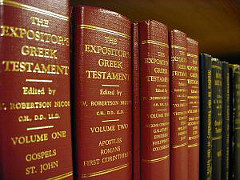 Reprinted with permission from As I See It, which is available free by writing to the editor at [email protected]
Reprinted with permission from As I See It, which is available free by writing to the editor at [email protected]
Some weeks back, on a preachers’ discussion site, I shared an extended quotation from the great Greek scholar A. T. Robertson (1863-1934) on the extreme importance, even necessity, for Bible preachers to study and learn the Greek language, for the sake of their ministry. In part, that quote said—
The physician has to study chemistry and physiology. Other men may or may not. The lawyer has to study his Blackstone. The preacher has to know his Bible or the people suffer the consequences of his ignorance, as in the case of the physician or the lawyer. The extreme in each instance is the quack who plays on the ignorance and prejudice of the public.
It is true that the minister can learn a deal about his Bible from the English versions, many of which are most excellent. There is no excuse for any one to be ignorant of his English Bible, which has laid the foundation of our modern civilization. But the preacher lays claim to a superior knowledge of the New Testament. He undertakes to expound the message of the gospel to people who have access to the English translations, and many of these are his equal in general culture and mental ability. If he is to maintain the interest of such hearers, he must give them what they do not easily get by their own reading. It is not too much to say that, however loyal laymen are to the pulpit, they yet consider it a piece of presumption for the preacher to take up the time of the audience with ill-digested thoughts. The beaten oil is none too good for any audience.
Now the preacher can never get away from the fact that the New Testament was written in the Greek language of the first century A.D. The only way for him to become an expert in this literature of which he is an exponent by profession is to know it in the original. The difficulty of the problem is not to be considered. One will not tolerate such an excuse in a lawyer or in a physician. The only alternative is to take what other scholars say without the power of forming an individual judgment. Some lawyers and physicians have to do this, but they are not the men that one wishes in a crisis.
The preacher lets himself off too easily and asserts that he is too busy to learn his Greek Testament. In a word, he is too busy about other things to do the main thing, to learn his message and to tell it. Fairbairn says: ‘No man can be a theologian who is not a philologian. He who is no grammarian is no divine.’ Melancthon held that grammar was the true theology, and Mathias Pasor argued that grammar was the key to all the sciences. Carlyle, when asked what he thought about the neglect of Hebrew and Greek by ministers, blurted out: ‘What!? Your priests not know their sacred books!?’
(These words are taken from Robertson’s superb little book, The Minister and His Greek New Testament, pp. 80-83; I quoted them at greater length in AISI 2:11).

 Reprinted with permission from
Reprinted with permission from 
Discussion